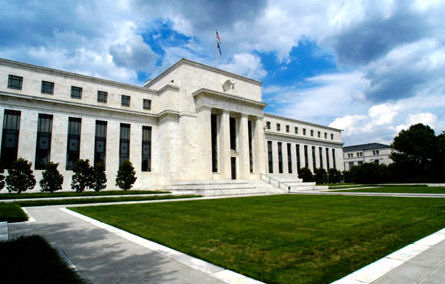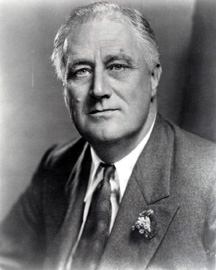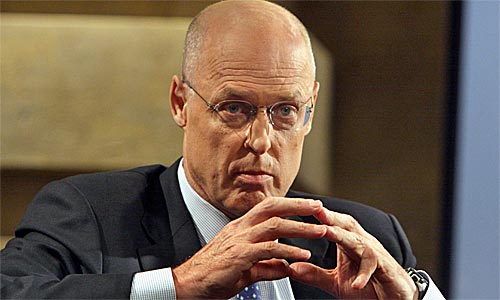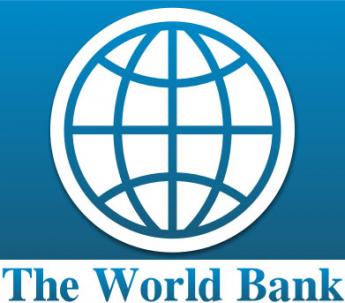Related Topics
Dislocations: Financial and Fundamental
The crash of 2007 was more than a bank panic. Thirty years of excessive borrowing had reached a point where something was certain to topple it. Alan Greenspan deplored "irrational exuberance" in 1996, but only in 2007 did everybody try to get out the door at the same time. The crash announced the switch to deleveraging, it did not cause it.
Whither, Federal Reserve? (2)After Our Crash
Whither, Federal Reserve? (2)
Philadelphia Changes the Nature of Money
Banking changed its fundamentals, on Third Street in Philadelphia, three different times.
Rescuing International Finance?
Let's begin this discussion of international finance by relating the story of how the United States solved the same problem in 1913. This wasn't a ho-hum bit of history, it set the pattern the world is now about to adopt or reject. Remember, our current lame duck President comes from Texas.

|
| Federal Reserve Building |
In 1913, the Federal Reserve system was created. It had various purposes, but it essentially stripped the state governments of the ability to adjust interest rates and placed that power in Washington DC. The appointment process to the Fed board was tinkered with to achieve as much independence from politics as possible, although it was unrealistic to think politics would be totally excluded. Politicians never give up power voluntarily, but in this case, they also escaped blame for the unpleasant things a central bank is occasionally called on to do, so it was a deal. The remaining uncertainty thus became the question of whether the states would yield to federal authority on interest rates, something they had consistently resisted ever since the Constitution was ratified. The first resister was Texas.

|
| Franklin D. Roosevelt |
It suited the Texas economy to have lower interest rates than other states, but the fledgling Federal Reserve decreed that the nation as a whole needed higher rates. In a fairly typical Texas style, Texas just lowered rates anyway. Almost immediately, nobody would deposit money in Texas banks, who were flooded with requests for loans from the rest of the country. That situation couldn't last more than a few days, so Texas capitulated, and no state has defied the Federal Reserve since then. In this little story lies the hope that a similar international banking arrangement can be devised, and announced shortly after November 15. That would probably put George W. Bush in a class with George Washington and Abraham Lincoln in the history books, his current low popularity not withstanding. For that reason alone, there is cause for concern about the newly elected incoming President. The worrisome historical model at this level lies in the refusal of newly elected Franklin D. Roosevelt to cooperate with the lame duck Herbert Hoover during a similar economic crisis of 1933. On the level of "practical" politics, Roosevelt got away with this deplorable behavior, by enacting many of Hoover's proposals six months later and taking full credit. The country was much worse off as a result, but Roosevelt nevertheless seems to have achieved enduring historical praise for his imaginative ideas. This time, one would hope that fear of the blogosphere, the London Economist and the Wall Street Journal would make such behavior politically unprofitable for either Obama or the maverick McCain. But you never know.

|
| Henry Paulson |
Now, to return to the present crisis. In a sense, every type of financial institution from banks to hedge funds, every nation from America to Zimbabwe, and every expert from Hank Paulson to Barney Frank -- has been tested, and occasionally failed quite visibly. People are scared, have every reason to be. But on the other hand, sound reasoning will never defeat politics and financial greed, except in a rare crisis containing obvious general danger. So, this mess represents an opportunity for the think tanks to be given a chance at leadership, just as John Maynard Keynes was listened to respectfully at Breton Woods in 1944. It was just about the last time a guru got his way without the use of financial power or an overwhelming voter mandate. As Franklin Roosevelt is reported to have said, "I don't understand a word the man says, but we must do something."

|
| Barney Frank |
Let's use a few examples out of a great many available. Ireland issued a guarantee for all the deposits in its banks. Immediately, money poured into Irish banks from British depositors, unsettling the British banking system. So the United Kingdom had to issue the same guarantee, and then other nations followed. America rescued Bear Stearns, Fannie Mae, and AIG, and finally called a halt at Lehman Brothers. Other nations copied this approach of rescuing institutions in trouble until the Bank of England copied the Swedish approach of 1991 of reversing this approach. If you are in a sinking lifeboat, you want to rescue the best rowers, not the weakest. But there are some small countries with big banks, like Switzerland and Iceland, where it would be impossible for a small government to rescue a huge international bank within its borders. Conversely, the Eastern European countries have essentially no local banks. In the case of Hungary, most home mortgages were held in Austrian and Swiss banks. When the flow of funds forced a devaluation of the local currency, the cost of almost every mortgage in Hungary doubled, and the national government could do nothing about it.
Let's mention what may well be the largest such factor in this international banking game, the so-called Japanese carry trade. When the overheated Japanese stock market collapsed fifteen years ago, the Ministry of Finance responded by lowering interest rates to one or two percent. Taking into account the inflation rate, Japanese banks were paying the borrower to take their money. So, the international banking community promptly responded by borrowing money in Japan at 2% and lending it out in Germany at 8%. Amounts of money in the trillions churned through this money machine. An unknowable but large amount of this money originated in China, which was trying to prevent its surpluses from provoking a revolution with inflation. The Japanese carry trade is at an end except in reverse, as money is flowing back to the now seemingly safe Japanese economy. Perhaps even a casual reader can look up from the World Series and the presidential election, to realize that absolutely everybody is scared, and possibly scared enough to do something cooperatively. It means loss of national power and sovereignty for everybody, a reconsideration of the European Common Market, and setting aside any disruptive schemes to discipline Premier Putin's behavior as a hidden by-product. As Frank Roosevelt said, we don't understand a word of it, but we must do something.

|
| The World Bank Logo |
Among the small practical ideas advanced, one of the most promising is to persuade the Chinese government to float its currency. We have historically tolerated small primitive countries when they try to struggle out of poverty by artificially cheapening their currency. In China's case, and before that in Japan's, cheapening the currency in order to stimulate exports has been politely referred to as "pegging the currency to the dollar". Pegging it low, that is. But Japan and China are no longer barefoot and aspire to become important figures in international finance. China is said to resist this proposal on the grounds that it needs 7% annual growth to prevent social unrest leading to a revolution. To some extent, this is probably just bargaining talks, and the counter-proposal offered is to strengthen Oriental power within the International Monetary Fund, as part of the process of increasing the power of the now-indolent IMF. We will have to wait for November 15 to see if clever little schemes like this one will suffice for the purpose. Much depends on China's willingness to cooperate, but even more, depends on the validity of blaming present messes on currency manipulation for the purpose of mercantilism. Beggar thy neighbor behavior has certainly been common; the question is whether it was the main cause.
If all those think tanks led by the Bank of England, have found the stone whose removal will start a benevolent avalanche, a second Breton Woods conference might just get us out of the soup; within two years we should be pleased with the way our cleverness restored the world to prosperity. If not, more grandiose ideas must be desperately considered. Europe must abandon all those silly five-hundred-page constitutions and form a national union. In our own case, that worked for eighty years and then we had a civil war, but even a repetition of all that sounds better than what we now face. If Europe simply cannot seize the moment, it is very likely to retreat into insignificance. Under those changed circumstances, the world economy will amount to three nations: China, India and the USA. We have yet to learn whether the Chinese and particularly the Indian governments can summon up enough domestic leadership to deserve a place in international leadership. And that presently is far from certain.
Originally published: Tuesday, October 28, 2008; most-recently modified: Sunday, July 21, 2019